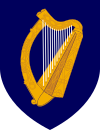
Back تيشخ Arabic تيشخ ARZ Taoiseach AST Прэм’ер-міністр Ірландыі Byelorussian Министър-председател на Република Ирландия Bulgarian Taoiseach Breton Taoiseach Catalan Taoiseach Czech Taoiseach Welsh Taoiseach Danish
| Taoiseach | |
|---|---|
 | |
since 9 April 2024 | |
| Style | Irish: A Thaoisigh |
| Type | Head of government[a] |
| Member of | |
| Reports to | Oireachtas |
| Residence | None[b] |
| Seat | Government Buildings, Merrion Street, Dublin, Ireland |
| Nominator | Dáil Éireann |
| Appointer | President of Ireland |
| Term length | While commanding the confidence of the majority of Dáil Éireann. No term limits are imposed on the office. |
| Precursor | President of the Executive Council |
| Formation | 29 December 1937[c][1] |
| First holder | Éamon de Valera[c] |
| Deputy | Tánaiste |
| Salary | €243,895 annually (2024)[2] (including €113,679 salary as a TD)[2] |
| Website | Department of the Taoiseach |
 |
|---|
The Taoiseach (/ˈtiːʃəx/ ) [d] is the head of government or prime minister of Ireland.[a] The office is appointed by the President of Ireland upon the nomination of Dáil Éireann (the lower house of the Oireachtas, Ireland's national legislature) and the office-holder must retain the support of a majority in the Dáil to remain in office.
The Irish word taoiseach means "chief" or "leader", and was adopted in the 1937 Constitution of Ireland as the title of the "head of the Government or Prime Minister".[a] It is the official title of the head of government in both English and Irish, and is not used for the prime ministers of other countries, who are instead referred to in Irish by the generic term príomh-aire.[e] The phrase an Taoiseach is sometimes used in an otherwise English-language context, and means the same as "the Taoiseach".[4]
The incumbent Taoiseach is Simon Harris, TD, leader of Fine Gael, who took office on 9 April 2024 following the resignation of Leo Varadkar and under a planned rotation as part of the coalition agreement between Fianna Fáil, Fine Gael, and the Green Party. Varadkar held the post from December 2022 and Micheál Martin, TD held the post from June 2020 until December 2022 as part of that agreement. Varadkar tendered his resignation as Taoiseach to the President on 8 April 2024; he was succeeded by Simon Harris the next day after his Dáil election and appointment, becoming the youngest officeholder in state history.[5]
Cite error: There are <ref group=lower-alpha> tags or {{efn}} templates on this page, but the references will not show without a {{reflist|group=lower-alpha}} template or {{notelist}} template (see the help page).
- ^ "Former Taoisigh". www.gov.ie. Government of Ireland. 1 November 2018. Archived from the original on 4 March 2020. Retrieved 14 February 2024.
- ^ a b "Salaries, Houses of the Oireachtas". Oireachtas. Retrieved 18 June 2024.
- ^ "Taoiseach". Lexico UK English Dictionary. Oxford University Press. Archived from the original on 22 March 2020.
- ^ O'Leary, Brendan (April 1991). "An Taoiseach: The Irish prime minister". West European Politics. 14 (2): 133–162. doi:10.1080/01402389108424849. Retrieved 9 August 2024.
- ^ "Cabinet members receive seals of office after reshuffle". RTÉ News. 9 April 2024. Archived from the original on 9 April 2024. Retrieved 9 April 2024.
